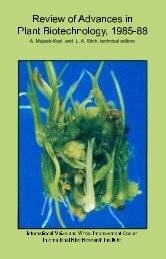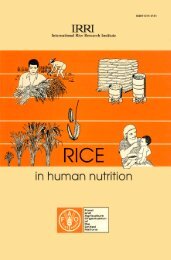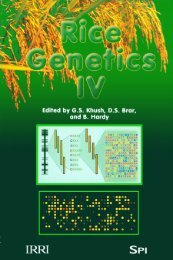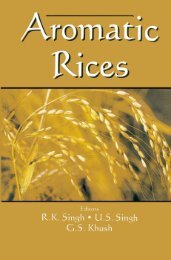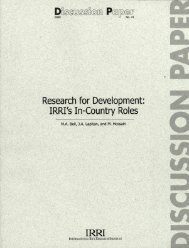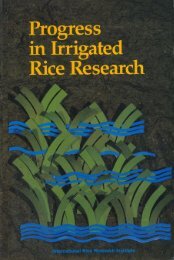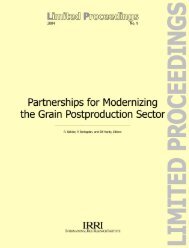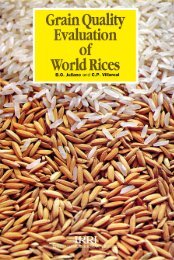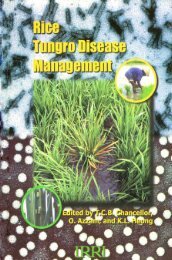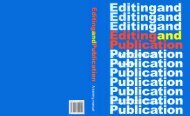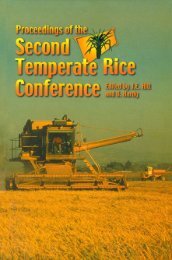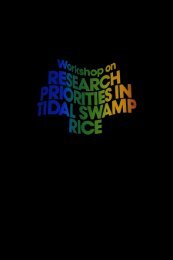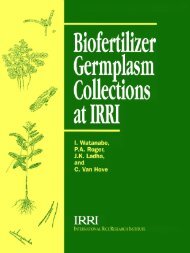An adventure in applied science - IRRI books - International Rice ...
An adventure in applied science - IRRI books - International Rice ...
An adventure in applied science - IRRI books - International Rice ...
- No tags were found...
Create successful ePaper yourself
Turn your PDF publications into a flip-book with our unique Google optimized e-Paper software.
80 History of the <strong>International</strong> <strong>Rice</strong> Research Institutehe jo<strong>in</strong>ed <strong>IRRI</strong> as assistant director <strong>in</strong> February 1960 and 2 years later waspromoted to associate director.To repeat, Wortman made a last<strong>in</strong>g contribution <strong>in</strong> help<strong>in</strong>g shape <strong>IRRI</strong>’sresearch program, <strong>in</strong> gett<strong>in</strong>g the tra<strong>in</strong><strong>in</strong>g well under way, and <strong>in</strong> lay<strong>in</strong>g thefoundation for the outreach programs that the Institute was to develop later.Wortman left <strong>IRRI</strong> <strong>in</strong> April 1964, to the general dismay of his associates, toaccept the position of director of the P<strong>in</strong>eapple Research Institute (<strong>in</strong> Hawaii).In 1966 when Moseman left the Rockefeller Foundation, Harrar <strong>in</strong>vited Wortmanto become director of agricultural <strong>science</strong>s. In 1970, Wortman waspromoted to the position of vice president of the foundation. Wortmanreta<strong>in</strong>ed his concerned <strong>in</strong>terest <strong>in</strong> food and population problems, however,and with Ralph W. Cumm<strong>in</strong>gs, Jr., wrote a book entitled To Feed This World,published by the Johns Hopk<strong>in</strong>s Press <strong>in</strong> 1978. The work received excellentreviews and is a major addition to the literature on food production and theworld’s burgeon<strong>in</strong>g population.After Wortman’s departure from <strong>IRRI</strong>, Harrar and Moseman suggestedthat A. Col<strong>in</strong> McClung, the soil scientist <strong>in</strong> the Rockefeller Foundation’sColombian Agricultural Program, be considered as a candidate to replace him.They <strong>in</strong>dicated their confidence <strong>in</strong> McClung and said that if he were <strong>in</strong>terested<strong>in</strong> the opportunity, they would be will<strong>in</strong>g to transfer him to <strong>IRRI</strong>. I went toColombia <strong>in</strong> April 1964, <strong>in</strong>terviewed McClung and his wife, and was muchimpressed. Mutual <strong>in</strong>terest developed and McClung went to <strong>IRRI</strong> later thesame month. He liked what he saw, and he and his family arrived to stay <strong>in</strong>August of that year.With degrees <strong>in</strong> soil <strong>science</strong> from the University of West Virg<strong>in</strong>ia (BS) andCornel1 University (MS and Ph D), McClung had had extensive experiencewith tropical soils. After serv<strong>in</strong>g North Carol<strong>in</strong>a State University as a researchprofessor of agronomy, he jo<strong>in</strong>ed the IBEC Research Institute <strong>in</strong> Brazil <strong>in</strong> 1956and rema<strong>in</strong>ed until 1960, when he jo<strong>in</strong>ed the Rockefeller Foundation’s program<strong>in</strong> Colombia.McClung’s contributions to <strong>IRRI</strong>’s success were substantial. He ran theSaturday sem<strong>in</strong>ars and adm<strong>in</strong>istered the tra<strong>in</strong><strong>in</strong>g program through 1967. Hiscapabilities <strong>in</strong> develop<strong>in</strong>g a sizable and effective outreach program wereespecially outstand<strong>in</strong>g. For example, dur<strong>in</strong>g the year it took to get the Indianprogram <strong>in</strong>to operation, McClung traveled <strong>in</strong> India with a USAID representativework<strong>in</strong>g out the details with government authorities <strong>in</strong> that country. Healso cooperated closely with the Ford Foundation <strong>in</strong> their rice programs <strong>in</strong>Asia. Moreover, he <strong>in</strong>terviewed and recommended most of the people whoultimately filled the posts <strong>in</strong> <strong>IRRI</strong>’s outreach programs.Articulate, warm, and quietly humorous, McClung met people well andimpressed them not only with his pleas<strong>in</strong>g personality and unmistakabletrustworth<strong>in</strong>ess but with his logical th<strong>in</strong>k<strong>in</strong>g. It is not surpris<strong>in</strong>g that he left<strong>IRRI</strong> <strong>in</strong> 1971 to accept the position of deputy director-general of CIAT <strong>in</strong>Colombia and then jo<strong>in</strong>ed the New York office of the Rockefeller Foundation<strong>in</strong> 1973. When IADS was formed <strong>in</strong> 1975-76, McClung was <strong>in</strong>vited to becomeits executive officer, and <strong>in</strong> 1979 he was made president of that organization,




